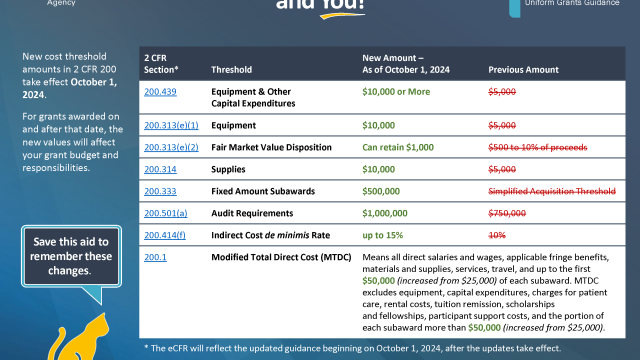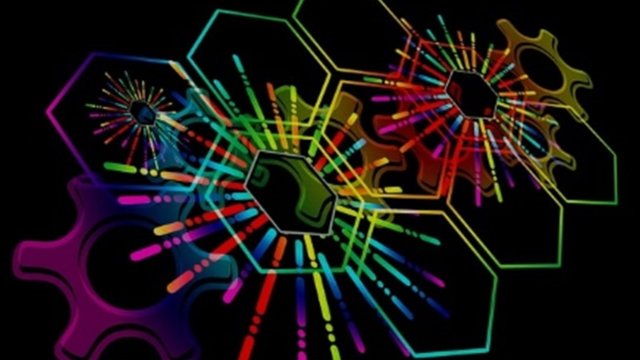What’s New in the Uniform Grants Guidance 2024 Revision to 2 CFR 200
Join the EPA Grants Community
Subscribe to the EPA Grants Update Listserv for periodic email updates.
On this page:
Introduction
The Office of Management and Budget (OMB) made significant updates to 2 Code of Federal Regulations (CFR) 200 which establishes administrative requirements, cost principles, and audit requirements for all Federal financial assistance. The updates, known as the Uniform Grants Guidance 2024 Revision, apply to projects that start on or after October 1, 2024. Current recipients should work with their Grant Specialists and Project Officers to understand when and if their current projects are affected.
You should be aware of the changes and how they could affect your project.

Benefits
The updated guidance benefits applicants and recipients in many ways.
- Guidance is written in plain language to clarify concepts and terms that have been subject to multiple interpretations.
- Grant announcements—also known as Notices of Funding Opportunity (NOFOs)—are streamlined and shortened.
- Application requirements for new Federal financial assistance are simplified.
- Administrative burdens on applicants and recipients are reduced.
- Flexibility for community engagement-related activities is increased.
Key Changes
The following highlights call attention to some of the most significant changes in each subpart of 2 CFR 200.

Acronyms and Definitions (Subpart A (Sections 200.0 -200.1)) and General Provisions (Subpart B (Sections 200.100-200.113))
- The term “recipient or subrecipient” replaces “non-federal entity” globally — except when non-federal entity refers to statutory provisions.
- An applicant, recipient, or subrecipient is now required to promptly disclose when it has “credible evidence” of violations of Federal criminal law involving fraud, conflict of interest, bribery, or gratuity violations.

Pre-Award (Subpart C (Sections 200.200-200.217))
- Notice of Funding Opportunity (NOFO) announcements use a streamlined template.
- Use of plain language eliminates jargon and ensures consistent use of terms.
- Programs may translate NOFOs to languages other than English.
- Organizations can more easily identify their eligibility for funding opportunities.
- Recipients and subrecipients must now inform employees in writing of whistleblower rights and protections.

Post-Award (Subpart D (Sections 200.300-200.346))
- Recipients and subrecipients must take reasonable cybersecurity and other measures to safeguard sensitive information.
- Similar to States, Tribes must follow the same policies and procedures used for procurements made with non-Federal funds when they conduct procurement transactions under a Federal financial assistance agreement.
- The maximum amount for fixed amount subawards is $500,000 (changed from $250,000); fixed amount subawards still require approval from EPA’s Office of Grants and Debarment.
- The maximum fair market value for equipment that may be retained, sold, or otherwise disposed of with no further responsibility to EPA or a pass-through entity is $10,000 (increased from $5,000).
- Recipients are required to sell at the end of the grant period unused supplies that exceed an aggregate value of $10,000.
- Three types of procurement are clarified: informal procurement methods (for micro-purchases and simplified acquisitions); formal procurement methods (through sealed bids or proposals); and noncompetitive procurement methods.
- Recipients have additional responsibilities when closing a grant.
- EPA must report a recipient’s non-compliance in SAM.gov, including failure to submit all final reports.

Cost Principles (Subpart E (Sections 200.400-200.476))
- The prior approval requirement is removed for several cost categories, including participant support costs.
- The de minimis indirect cost rate percentage is 15% (increased from 10%).
- The threshold for defining equipment and other capital expenditures is $10,000 (increased from $5,000).
- Allowable organization costs now include costs related to data (for example, gathering, managing, publishing, using, etc.) and evaluation (for example, reviewing evidence, conducting evaluations, sharing results, etc.).
- Closeout costs and post-closeout adjustments and continuing responsibilities are revised.

Audit Requirements (Subpart F (Sections 200.500-200.521))
- The threshold value for Single Audits is $1,000,000 (increased from $750,000).

Learn more about grants webinars routinely hosted by EPA.
Webinars
EPA is hosting webinars to help applicants and recipients understand the updates to the guidance and provide an opportunity for participants to submit questions.
Upcoming Webinars
There are no upcoming webinars scheduled at this time. Webinars will be listed here when they are scheduled.
Previous Webinars
- 2 CFR Updates to the Appendix, NOFOs, and Competition
December 5, 2024
This webinar provided potential grant applicants with a summary of changes to 2 CFR 200 Appendix I and their impact on Notices of Funding Opportunities (NOFOs) issued by EPA. - 2024 Revisions to 2 CFR Part 200 Regulations – Impacts to Tribes as Federal Award Recipients
December 4, 2024
The Uniform Administrative Requirements, Cost Principles, and Audit Requirements for Federal Awards (commonly called the Uniform Grants Guidance) is a government-wide framework for grants management and a set of rules and requirements for federal awards. During this webinar, the EPA provided an overview of recent changes to the Uniform Grants Guidance that became effective on October 1, 2024, with a particular focus on changes that impact Tribal governments as federal award recipients. - EPA Grant Terms and Conditions for Fiscal Year 2025
October 30, 2024
This webinar provided training on the new General Terms and Conditions that went into effect on October 1, 2024. This webinar also covered changes that were brought on by the revisions to the Uniform Grants Guidance, 2 CFR Part 200. - 2024 Revisions to 2 CFR Part 200 Regulations
October 9, 2024
The EPA presenters reviewed the most impactful revisions to help guide our grants’ stakeholders through these changes. Some of the topics covered were changes to threshold amounts, equipment and supplies, updates of definitions and acronyms, new reporting requirements on budget and program plans as well as program performance, modifications to the termination clause, and procurement policies.
Resources
-
Thresholds Aid

Updates to Cost Thresholds and You! infographic showing new threshold amounts.
-
Micro-Purchase and Simplified Acquisition

Procurement Best Practices Guide with guidance on the use of micro-purchase procedures.
-
Participant Support Costs

Revisions and clarifications to EPA’s Guidance on Participant Support Costs.
-
Indirect Cost Policy

New policy to align indirect costs with 2 CFR Part 200 and provide flexibility and consistency for assistance agreement recipients.
-
Conflict of Interests and Subaward Policy

Updated answers to Subaward FAQs and revisions to EPA’s Financial Assistance COI Policy and EPA’s Subaward Policy.
-
No-Cost Amendments

Process to amend fully funded assistance agreements to incorporate the OMB’s revisions to 2 CFR 200.
EPA Contacts
General questions about the Uniform Grants Guidance 2024 Revision may be submitted to EPA through the form at the bottom of the Contact Us about EPA Grants page.
Applicants and potential applicants with questions about a specific Notice of Funding Opportunity (NOFO) should reach out to the EPA point of contact identified in the NOFO.
Current recipients of EPA grants should work with their Grant Specialists and Project Officers to address any questions about their current projects.
